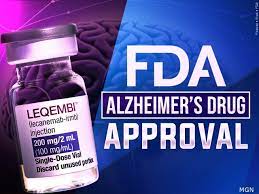Written By: Dr. Chad Hensel, PT, DPT, MHS, CSCS
 Alzheimer’s disease is well-known and well-feared, afflicting over 6 million Americans. This progressive neurodegenerative disease impairs cognition and function over time. A diagnosis is one of great anxiety not only for the patient’s future but for the family. As a loved one with Alzheimer’s progresses, they start to lose the personality and memories that envelope their person. While the patient may be unaware of these changes, the family, friends and loved ones must endure the difficult horror movie of watching the decline. This year marks a light of hope that has been a very long wait—the drug lecanemab (brand name Leqembi) has recently gained full FDA approval, opening the door for Medicare coverage. This drug has the potential to make a large impact on this terrible disease.
Alzheimer’s disease is well-known and well-feared, afflicting over 6 million Americans. This progressive neurodegenerative disease impairs cognition and function over time. A diagnosis is one of great anxiety not only for the patient’s future but for the family. As a loved one with Alzheimer’s progresses, they start to lose the personality and memories that envelope their person. While the patient may be unaware of these changes, the family, friends and loved ones must endure the difficult horror movie of watching the decline. This year marks a light of hope that has been a very long wait—the drug lecanemab (brand name Leqembi) has recently gained full FDA approval, opening the door for Medicare coverage. This drug has the potential to make a large impact on this terrible disease.One of the primary characteristics of Alzheimer’s is the build-up of amyloid plaques within the brain tissue. Leqembi works by specifically targeting this amyloid plaque. While various drugs target disease symptoms, Leqembi marks the first time full regulatory approval has been granted to a drug meant to slow the progression of the disease. In its phase 3 clinical trial, 1,795 patients from across the country showing mild cognitive impairment or early-stage disease were examined in a randomized, controlled study. Results showed the disease progression was slowed by 27% at the dosages examined. This positive result needs to be weighed against a couple of drawback areas as well.
 Excitement over its effects is tempered by discussion of potential side effects. The FDA is including a “boxed warning”, which is its strongest warning label, over the possibility of seizure or death occurring. In the clinical trials, approximately 12.6% of patients receiving Leqembi developed brain swelling and 17% experience brain bleeds. However, it should be noted that of those that had these side effects that were detected on MRI, only 25% had symptoms.
Excitement over its effects is tempered by discussion of potential side effects. The FDA is including a “boxed warning”, which is its strongest warning label, over the possibility of seizure or death occurring. In the clinical trials, approximately 12.6% of patients receiving Leqembi developed brain swelling and 17% experience brain bleeds. However, it should be noted that of those that had these side effects that were detected on MRI, only 25% had symptoms.
The other sizable barrier is cost. Leqembi will be delivered by IV infusion every two weeks and comes with an initial price tag of $26,400! With the recent news of full FDA approval, CMS has provided instruction that Medicare will provide coverage. This would mean 80% coverage after the deductible is met, but the 20% remaining co-insurance can still amount to several thousand dollars of out-of-pocket expense. Cost-saving options and need-based solutions are hopefully coming on the horizon.
While not a cure, evidence of Leqembi showing a slowing of the disease progression reaches a monumental breakthrough and beacon of hope to millions of patients.
Want to learn more about Alzheimer’s drugs and other medications/supplements that are designed to help improve physical and cognitive performance? Consider taking my Live CE Webinar on August 18, Medications and Supplements, where we examine multiple medications to identify the side effects that impact our world of Rehabilitation! Can’t attend? There is also an online video option where you can take it on your schedule and at your own pace.
Explore online continuing education courses from Chad below:
A Rehab Professional’s Guide to Pharmacology
Bariatric Management Effective Assessment and Safe Treatment
Exploring Medications and Supplements and the Impact on Physical and Cognitive Function
High Intensity Interval Training (HIIT)
Utilizing Movement Analysis for Exercise Prescription: Part 1
Utilizing Movement Analysis for Exercise Prescription: Part 2
Visit summit-education.com for more information.
References:
Food and Drug Administration. fda.gov
Swanson, C. J., Zhang, Y., Dhadda, S., Wang, J., Kaplow, J., Lai, R. Y. K., Lannfelt, L., Bradley, H., Rabe, M., Koyama, A., Reyderman, L., Berry, D. A., Berry, S., Gordon, R., Kramer, L. D., & Cummings, J. L. (2021). A randomized, double-blind, phase 2b proof-of-concept clinical trial in early Alzheimer’s disease with lecanemab, an anti-Aβ protofibril antibody. Alzheimer’s research & therapy, 13(1), 80. https://doi.org/10.1186/s13195-021-00813-8
Van Dyck, C. H., Swanson, C. J., Aisen, P., Bateman, R. J., Chen, C., Gee, M., Kanekiyo, M., Li, D., Reyderman, L., Cohen, S., Froelich, L., Katayama, S., Sabbagh, M., Vellas, B., Watson, D., Dhadda, S., Irizarry, M., Kramer, L. D., & Iwatsubo, T. (2023). Lecanemab in Early Alzheimer’s Disease. The New England journal of medicine, 388(1), 9–21. https://doi.org/10.1056/NEJMoa2212948
Centers for Medicare and Medicaid Services. cms.gov
